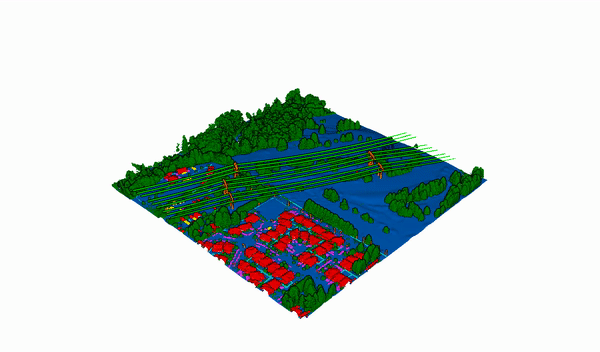
Talk Title: Addressing the Data Desert in Aerial LiDAR
Speaker: Prof. Vijayan K. Asari, University of Dayton, Ohio, USA
Time: March 30, 2022 (Tuesday) at 5 pm IST
Jointly organized by IEEE GRSS Bangalore and Kerala Sections
Venue: [Virtual talk on Zoom Webinar]
(Register for free and attend)
https://zoom.us/webinar/register/WN_6jSfdOOKQ-KGSM6NyiYCvQ
Shortened link: https://bit.ly/36DuZ0S
Abstract:
We present the Dayton Annotated LiDAR Earth Scan (DALES) data set, a new large-scale aerial LiDAR data set with over a half-billion hand-labeled points spanning 10 square kilometers of area and eight object categories. Large annotated point cloud data sets have become the standard for evaluating deep learning methods. However, most of the existing data sets focus on data collected from a mobile or terrestrial scanner with few focusing on aerial data. Point cloud data collected from an Aerial Laser Scanner (ALS) presents a new set of challenges and applications in areas such as 3D urban modeling and large-scale surveillance. DALES is the most extensive publicly available ALS data set with over 400 times the number of points and six times the resolution of other currently available annotated aerial point cloud data sets. This data set gives a critical number of expert-verified hand-labeled points for the evaluation of new 3D deep learning algorithms, helping to expand the focus of current algorithms to aerial data. We describe the nature of our data, annotation workflow, and provide a benchmark of current state-of-the-art algorithm performance on the DALES data set.
We note a gap in performance between methods developed for Mobile Laser Scanning (MLS) and Terrestrial Laser Scanning (TLS) datasets and their performance on the ALS benchmark. Specifically, these methods struggle to perform on small objects. To address these issues, we present a method to learn a diverse group of object categories from an unordered point set. We propose our Pyramid Point Network, which uses a dense pyramid structure instead of the traditional ’U’ shape, typically seen in semantic segmentation networks. This pyramid structure gives a second look, allowing the network to revisit different layers creating from various levels on the network, allowing for feature propagation. We introduce a Focused Kernel Point convolution (FKP Conv), which expands on the traditional point convolutions by adding an attention mechanism to the kernel outputs. This FKP Conv increases our feature quality and allows us to weigh the kernel outputs dynamically. This FKP Conv is the central part of our Recurrent FKP Bottleneck block, which makes up the backbone of our encoder. With this distinct network, we demonstrate competitive performance on three benchmark data sets.
Speaker Biography:
Dr. Vijayan K. Asari is a Professor in Electrical and Computer Engineering and Ohio Research Scholars Endowed Chair in Wide Area Surveillance at the University of Dayton, Dayton, Ohio, USA. He is the director of the Center of Excellence for Computational Intelligence and Machine Vision (Vision Lab) at UD. Dr. Asari received his B Tech degree in Electronics and Communications from the University of Kerala (College of Engineering, Trivandrum) in 1978, M Tech and PhD degrees in Electrical Engineering from the Indian Institute of Technology, Madras in 1984 and 1994 respectively. Prior to joining UD in February 2010, Dr. Asari worked as Professor in Electrical and Computer Engineering at Old Dominion University, Norfolk, Virginia for 10 years. Dr. Asari worked at National University of Singapore during 1996-98 and led a research team for the development of a vision-guided micro-robotic endoscopy system. He also worked at Nanyang Technological University, Singapore during 1998-2000 and led the computer vision and image processing related research activities in the Center for High Performance Embedded Systems at NTU.
As leaders in innovation and algorithm development, UD Vision Lab specializes in object detection, recognition and tracking in wide area surveillance imagery captured by visible, infrared, thermal, hyperspectral, and LiDAR (Light Detection and Ranging) sensors. Dr. Asari’s research activities also include 3D scene change detection, automatic visibility improvement of images captured in various weather conditions, human identification by face recognition, human action and activity recognition, and brain signal analysis for emotion recognition and brain machine interface.
Dr. Asari holds five patents and has published more than 700 research papers including 125 peer-reviewed journal papers in the areas of image processing, pattern recognition, machine learning, deep learning, artificial neural networks and high-performance embedded systems. Dr. Asari has supervised 30 PhD dissertations and 45 MS theses during the last 20 years. Currently several graduate students are working with him in different sponsored research projects. He has been participating in various federal and private funded research projects and he has so far managed around $27M research funding.
Dr. Asari received several awards for teaching, research, advising and technical leadership. He is a Senior Member of IEEE and an elected Fellow of SPIE, and member of several international societies including the IEEE Computational Intelligence Society, IEEE Computer Society, and Society for Imaging Science and Technology. Dr. Asari is a co-organizer of several SPIE and IEEE conferences and workshops.
Homepage: http://sites.udayton.edu/vasari1/

